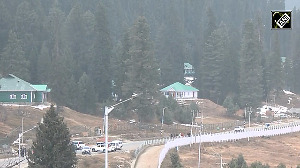Self-rule could lead to solution of the Kashmir issue and present a way out to preserve sovereignty of India and Pakistan, People' Democratic Party leader Mufti Mohammad Sayeed has said.
This, he said, is the only way out to 'eliminate the source of ethno-territorial conflict' in the sub-continent and integrate the region with the fast moving global economy.
"The basic premise of the self-rule formula is that while exploring a solution of the Kashmir issue, we have to look out for inter nation-state institutional mechanism that preserves sovereignty of the two nation-states (India and Pakistan) but still has a supranational basis," he said.
Such an arrangement is possible only by giving the institutional mechanism an economic basis, the former J&K chief minister told a seminar on 'Kashmir-The Way Ahead,' jointly organised by two US think-tanks, the Centre for Strategic and International Studies and the Stimson Centre, on Monday.
"In view of the past history, the stated positions and the emotional surcharge, a one-point-one-time solution for resolution of the conflict is a near impossibility," Sayeed said, adding that a step-by-step sequence of practical, less dramatic and insightful measures was an imperative for extrication of the state from the 'tragic muddle.'
Sayeed said for a sustainable solution of the problem, an 'innovative institutional arrangement having political, economic and security character' has to be put in place. Sayeed's recent suggestion of the 'self-rule' in J&K has evoked a mixed bag of reaction with the hardline Geelani faction Huriyat Conference strongly criticising it.
The solution of this intricate problem, Sayeed said, must be built on three essential elements -- introduction of clearly-defined fundamental principles of the solution, creation of a proper institutional arrangement for the integration of the state across the borders and combining this arrangement into the framework of Indian and Pakistan polity.
In all the discourses on Kashmir, he said, the only viewpoint that has 'unfortunately' not been adequately highlighted is that of the people of J&K, according to a summary of his remarks circulated by PDP.
"The problem is that the heterogeneity of views from within Jammu and Kashmir has become an easy excuse for their exclusion," he said, adding that as such there is need for a well-articulated set of views to emerge from the state that can form the basis of a fruitful dialogue.
Sayeed said the major breakthrough in the recent past has been the engagement of J&K's civil society and various sections of the society in the peace and reconciliation process through the prime minister's round table conferences and the working groups.
"The involvement of the principal stakeholders (people of Jammu and Kashmir) in the resolution process is now gaining ground," he said, describing it as the greatest achievement of the peace process. "This should not be allowed to slip away."
"It may move in fits and starts, but the direction is clear," he said, adding that during the last four years, political initiatives (local, domestic, bilateral and international) have all been moving in a positive direction, albeit at a slow pace.
Sayeed said a remarkable feature of the peace process, which has a bearing on its sustainability, is that for the first time in the history of J&K, the state government has initiated, catalysed and driven it.
"From being a passive recipient of bilateral initiatives, the state, immediately after the assembly election of October 2002, took the centre-stage to facilitate and drive the peace process," he said, adding that the government revived social collaboration, political reconciliation and democratic participation through innovations and various historic steps.
"Be it the healing-touch policy, opening of the Srinagar-Muzzaffarabad or the Poonch-Rawalakot roads, or allowing travel on permit basis, it all added up to a collective political engagement and consequent reduction in the structural and individual alienation," he said.
Sayeed said this reversal of roles of the state government driving these steps and the Union government endorsing it -- has meant a much wider grounds-feel of peace process in J&K, which has been seen, felt and heard.
"The net result is that there have been growing local stake in the peace process," he said and pointed out that to supplement the peace process, make it sustainable and catalyse its pace, the J&K government, in consultation with the Centre, decided to proceed with economic reconstruction in a manner that is acceptable to all.





